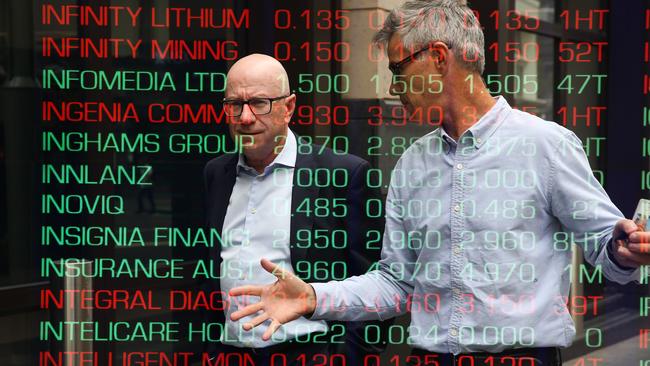The Australian dollar had just fallen below US64c against a strengthening US dollar.
On the surface, there is not much difference between the previous close of just above US64c, but for many, the 64c level was a comfort barrier.
Now reality is with us.
Last February, when our currency rose above US70c, seems a distant memory, and so we look further back and realise that around a year ago, the currency had fallen to US63c and that locked in Philip Lowe’s long series of interest rate rises
The message ringing through the RBA corridors is that unless markets change dramatically, the next interest rate move – probably in 2024 — must be higher, not lower.
And that message will soon reverberate around property and other markets. Global sharemarkets have already got the message.

Those retailers who ordered their Christmas imports priced in American dollars and did not hedge the currency risk face higher product costs. They need to find a way to add those costs to the ballooning cost of running a business including wage pressures, energy cost blowouts, insurance hikes and, in some states, higher property taxes.
Currently, retailers are optimistic that their non rent and mortgage-stressed consumers will pay the higher prices, but they can’t be certain.
The reasons for the fall in the Australian dollar are on public display.
They start in the US where the massive government spending and the presence of President Joe Biden on the United Auto Workers picket line (to be followed by Donald Trump) tells Americans that while currently inflation is on the decline, the US government’s spending and policies are working in the opposite direction to the US Federal Reserve policy.
So the odds are that US rates must rise, and that pushes up American bond rates and the US dollar. Our currency goes down.
To fund its spending spree, the US government must issue vast amounts of bonds and some of the traditional bond buyers like American banks and the Chinese are either no longer in the buying market or buying at a reduced level, so bond prices are falling and sending interest rates higher.
As I pointed out earlier in the week, we get a double dose.
Our interest rates are first impacted by what happens in the US and then by our governments and particularly state governments who are still spending up on infrastructure and are having trouble controlling their wage costs.
Victoria’s departing premier Daniel Andrews was, of course, the pacesetter in reckless spending and was allowed to continue because the credit rating agencies did not do their job and downgrade Victoria’s credit rating.
In the absence of responsible credit ratings, the new Victorian premier will probably keep spending because there appears to be a deal with the unions that as existing infrastructure projects are completed, there needs to be a replacement.
And so Andrews’ $125bn-plus eastern suburb “train to nowhere” keeps up the reckless spending.
If the new Victorian premier wants to send a signal that responsible government has returned to Australia’s second-largest state by population, the “train to nowhere” project should be suspended.
That will give the state the chance to raise private capital to fund Andrews’ last major decision – an innovative and massive housing project based on the availability of cheap and abundant land and rapid approvals.
In theory, it was very clever, and no other state has been able to match it. But it won’t help inflation because the building skills are not there to construct the dwellings – a problem that applies around the country.
The RBA therefore can’t afford to reduce interest rates.
Over in Japan, the yen has also been suffering from the rising US dollar, and the Japanese are now seriously thinking of intervening in their currency to stabilise it.
The problem with that strategy is that it represents a declaration of war with the currency traders. Unless Japan has unlimited funds and is prepared to engage in a huge fight, the currency traders will win.
Australia does not have the firepower to even consider taking on the currency traders, so we must go with the market and raise interest rates.
What can insulate Australia from these global interest rate trends is a strong China that drives a rise in iron ore, gas, coal and rural product prices.
At the moment, the cables from China portray a weakening property sector and a lot of pain as the country moves through its property crisis. But they are also looking at curbing the trade bans on Australia, which will help.
The longer term good news for Australia out of China is that the Chinese appear to be facing the property problem and not following the stance of Japan in past decades.
The Japanese refused to recognise they had a problem. But at the moment the headlines focus on the Chinese problems rather than the solutions.






The warning bells ring in the Reserve Bank loudly; all major retailers and those punting an interest rate fall in 2024 shudder.